Decenternet: Downsides of a Decentralized Internet
This will be my last post on Decenternet. I may revisit the topic at some point in the future, but I figure after this post I'll have much less to say for the near future. So far, I've been largely in favor of a decentralized Internet, warm to Decenternet in general while being critical of the company's tilt toward fear-based marketing tactics, and excited about the prospect of a truly decentralized worldwide network. However, I want to use this post to highlight some of the downsides to a decentralized Internet.
Usenet Spam, Flame Wars, and Other Garbage
Before the commercial web, the Usenet was a decentralized bulletin board system similar to today's Internet forums. While today's forums generally have an administrator, and many have channel moderators, that was not the case with Usenet. The reason forums have administrators and moderators is because of the problems created by the free and decentralized Usenet.
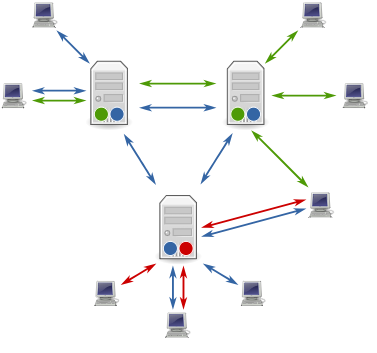
Decentralized infrastructure of Usenet.
Public Domain. Wikipedia.
If you've ever heard the terms "spam," "flame war," and "FAQ," they all began on the Usenet. Today, if someone spams a forum or starts a flame war, a moderator will typically issue a warning and then, if repeated, ban the user from the group. Most of us would agree that this is good to maintain order and stability, and to provide a safe environment for everyone within the forum.
The Usenet was organized into newsgroups. In order to post to a newsgroup, a user simply had to log on through a news reader. There were no applications, approval protocols, or sign-up forms, which means that anyone could post whatever they wanted to--usually with anonymity. And they did.
As a result of this libertarian free-for-all, bad actors started distributing pirated copyrighted material, pornography and other illicit propaganda, and they used the Usenet for other crimes, as well. Eventually, Internet Service Providers started blocking them.
The distributed Usenet system had its advantages. There is no doubt that the majority of users were upstanding citizens with good intentions. When there were only a few thousand users, mostly in government and universities where access was more available, the downsides were not as pernicious, but after the advent of the commercial Web, Usenet use grew as did all its associated downsides.
Why Isn't the Internet Decentralized?
To the naked eye, the modern Internet may appear to be decentralized, but it's an illusion. I have gone to great pains to show that, in its original development, the Internet was intended to be a decentralized network of computer nodes based on the values of ARPANET and cyberpunk ethos. Furthermore, I've explained how Decenternet upholds those values, and how they intend to make centralization a dirty word. But one might very well ask, "Isn't the Internet decentralized already?"
Actually, no. It appears to be so, but upon closer scrutiny, you can see that it isn't.
To get to the heart of Internet structure, you have to look at how data is routed. The Internet backbone is complex, intricate, and a bit obscure. Consider these words from Wikipedia's Internet Backbone entry:
The Internet backbone is a conglomeration of multiple, redundant networks owned by numerous companies.
The reference to "numerous companies" might sound like decentralization, but when you consider that these companies operate on a hierarchical structure centralized in a board of directors and a CEO, then management and operational decisions for these "redundant networks" rest in the hands of a few established elites. Reading further,
Because of the enormous overlap between long-distance telephone networks and backbone networks, the largest long-distance voice carriers such as AT&T Inc., MCI (Acquired in 2006 by Verizon), Sprint, and CenturyLink also own some of the largest Internet backbone networks. These backbone providers sell their services to Internet service providers (ISPs).
When commercial interests dictate how infrastructure is used, that is itself evidence of centralization and the opposite of decentralization. Furthermore, centralized governing authorities in the U.S. have given up their regulatory hubris to allow the market to function as these corporations dictate:
Antitrust authorities have acted to ensure that no provider grows large enough to dominate the backbone market. In the United States, the Federal Communications Commission has decided not to monitor the competitive aspects of the Internet backbone interconnection relationships as long as the market continues to function well.
In some countries, Internet access is controlled by the government, which censors data preventing their own citizens from accessing certain foreign websites in order to feed their citizens anti-U.S. or pro-nationalist propaganda. These political realities ensure the modern Internet continue in its centralized control whether users like it or not.
I'm not saying the Internet doesn't work as it is currently structured, but for all of its benefits, it is not decentralized. For more information on Internet structure, check out Rus Shuler's white paper on the subject.
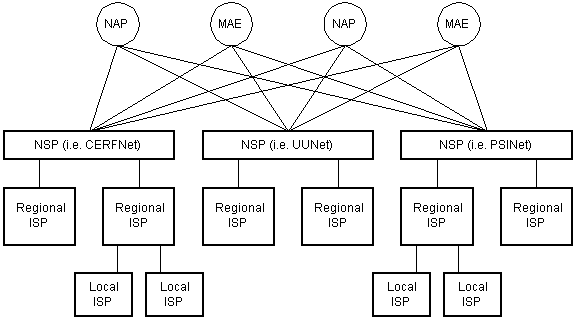
Internet infrastructure diagram by Rus Shuler.
Used by permission.
The Downsides to Decentralization
I'm a firm believer that for every upside there is an equal and opposite downside. That's true whether we're talking about centralization, decentralization, or cotton candy.
In 2011, a 27-year-old libertarian idealist named Ross Ulbricht set up a Tor marketplace on the dark Web called Silk Road.
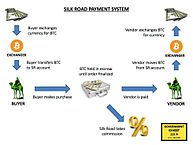
Silk Road payment system.
Public domain. Wikipedia
In 2013, the Federal Bureau of Investigation shut it down and arrested Ulbricht. He is currently serving a life sentence for money laundering and other crimes..
If the Internet were truly decentralized, with no controls whatsoever, it could become a massive openly visible Silk Road in a couple of years; unlike Ulbricht's Silk Road, which relied on darknet resources. It's easy to seize upon the benefits of decentralization, but the human race does not have a good track record at self-management. The reason we have governments is to curtail the evil impulses embedded in our DNA. That's not to say every human being is a criminal (most of us are as good as we can be given our DNA), but an Internet with no controls would allow the lowest grade elements to run rampant and wreak total havoc. Terrorists, drug traffickers, human traffickers, child pornographers, and more, could run free, with anonymity, and escape punishment.
On top of that, a completely decentralized Internet could make it difficult for law enforcement to investigate, apprehend, and bring to justice real criminals using the Internet for nefarious purposes.
If Not Decentralization, What Then?
I've been perfectly clear that I support net neutrality. However, centralized government oversight isn't the answer either. So what, then, is the answer?
I may be reading more into decentralization than what is intended. If I am, please forgive me. But I wouldn't want an Internet that is a free-for-all of Silk Road depravity. If decentralization leads to voluntary networks of organizations and individuals who commit themselves to maximizing freedom while minimizing misuse, abuse, and criminal activity, I'm all for it. I don't see how that can happen without some moderation and administration, much like how online forums operate today. It is likely that a decentralized Internet would allow individuals to employ such networks without interference from authoritarian entities, and it is also likely that progressive technology such as machine learning could be used to implement online police bots that search for undesirable activity on the Internet. But Decenternet doesn't cover any of this in their white paper. They do, however, dedicate approximately a page-and-a-half in their 70-page white paper to a discussion on #blockchain governance.
I'm glad they do, but it's hard to imagine what it will look like based solely on
That is why we adopted a governance model where the decision-making authority is divided equally among all forms of contributors, such as the core development team, spyce holders, miners, users, and third-party developers. These five core groups of contributors will always have 20 percent of the voting rights each at all times. It doesn’t matter how much spyce currency you hold; the voting influence of all spyce holders will never exceed 20 percent.
Spyce is the name of the cryptocurrency users can mine through the Anuvys operating system. This is all well and good, but the amount of influence for individuals within each of these groups is determined by the number of individuals participating, which is unknown at this time. Over time, the number of third-party developers, miners, users, and Spyce holders should grow--and quite possibly at a rapid rate early on--whereas the core development team will likely remain static or grow more slowly. That means individuals on the core development team will have more influence per capita than everyone else. Plus, what's to stop a core development team member from also being a miner and third-party developer? Presumably, they will each own Spyce, making them influential potentially in each of the voting pools. How is that any different than influence based on wealth or social status? This is not addressed in the white paper.
Furthermore, Decenternet intends to devote 10 percent of all Spyce produced to development, but without a real budget in place and no operations currently in place to produce Spyce, it is difficult to say whether that will be enough or too much.
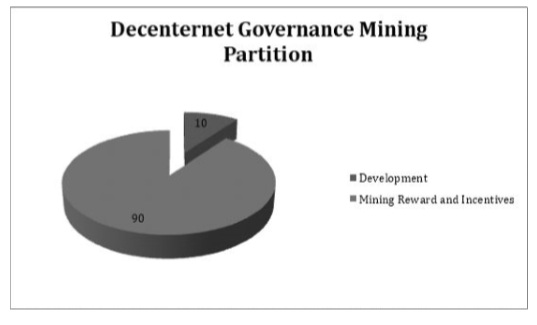
From the Decenternet white paper.
I also found no mention of alpha or beta testing, which are phases typically used by developers to work out bugs and correct issues before full public launch. While I can appreciate the interest in a decentralized Internet, there appears to be holes in Decenternet's plans that beg to be filled. A successful implementation of a decentralized Internet requires a well-thought plan that has been tested and vetted in every conceivable way.
I hope these articles on the history of the Internet, decentralization, and Decenternet have been helpful. I am by no means an expert, nor am I the sole arbiter of what is good for all. I merely have used these articles to voice my own concerns and advance my own ideas, but I encourage you to perform your own research. To learn more about Decenternet, check out the following links.
- Check out Decenternet’s website
- Check out ANUVYS
- Follow the Decenternet Facebook page
- Follow Decenternet on Twitter
- Join the Decenternet Telegram group

Review Me, Please

The backside 5 (my five latest posts):
- Tron's New Bitch and a Crypto Cock Fight
- 11 Things You Must Know About Decenternet
- Peace on Earth, Good Will Toward Bitcoin
- 21 Ways to Use the Steem Blockchain for Business
- Poetry Sunday: Love and War


Join us @steemitbloggers
Animation By @zord189
 ">
">created and used by veterans
with permission from @guiltyparties

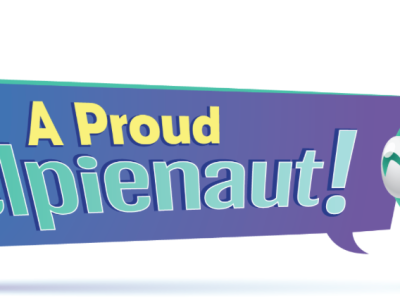
This is a great article! With the current crop of decentralisation mania, I worry that we are going to over-react against centralisation (which does have many tangible benefits). Sometimes, the arguments for complete decentralisation are straw men against some spectre of over-centralisation. However, as you point out, there are also downsides to complete decentralisation. Finding the balance is neccessary, but that can't be done if every cautious voice is drowned out in a fit of zealous fervour!
Thank you! I hope it comes through that I'm not against decentralization, but I do believe we should exercise caution and make sure we are implementing intelligent controls that minimize the downsides. Thanks for reading.
Very interesting, as usual, instructive reading.
I never looked at internet decentralization in this way.
It definitely makes me think.....
Slightly disappointed, though, you haven't pointed out the pros and cons of cotton candy.... :p
I thought about it, but I didn't want to make it TLDR. ;-)
Discussing the Pros AND Cons of a project is becoming more and more uncommon these days.
But doing so is the hallmark of a mature, fair and unbiased author.
Good on you, buddy.
RE: Your Post
"When you pick up one end of the stick, you pick up the other end too."
Namaste, JaiChai
By your argumentation you also argue against cryptocurrencies themselves...What if I told you there already is childporn hashed in BTCs Blockchain (would you want to destroy the whole chain?)...Monero can also be used to financially support terrorists without no1 ever realizing who it was and where did the funds go. The Steem also doesn’t have any dedicated moderators and people are forming "guilds" that do take this responsibility on themselves etc.
Basically freedom supports both good and bad actors. I kinda didn’t get what it is you want from the text. Could you explain to me what it is:)?
I perhaps didn't explain myself clearly. I'm not arguing to do away with technology because of the downsides. If that were the case, we could just argue against life itself. I am saying there are dangers to embracing decentralization for the sake of decentralization. For every upside there is a downside. There should be some balance in the process of thinking about such things. Ideally, the decentralization element would address the downsides and formulate a solution.
Understood and agreed!
Let me grab my coffee and I'll give it a read..thanks
Nice information. The Internet has become a requirement of some of the earth's population. Most of our data is there. What happens when the data is used by naughty people.
Posted on Twitter
And LinkedIn
@blockurator upvoted this post via @poetsunit!!

Poetsunited - DISCORD - @poetsunited - witness upvote
You got a 6.39% upvote from @postpromoter courtesy of @blockurator!
Want to promote your posts too? Check out the Steem Bot Tracker website for more info. If you would like to support the development of @postpromoter and the bot tracker please vote for @yabapmatt for witness!